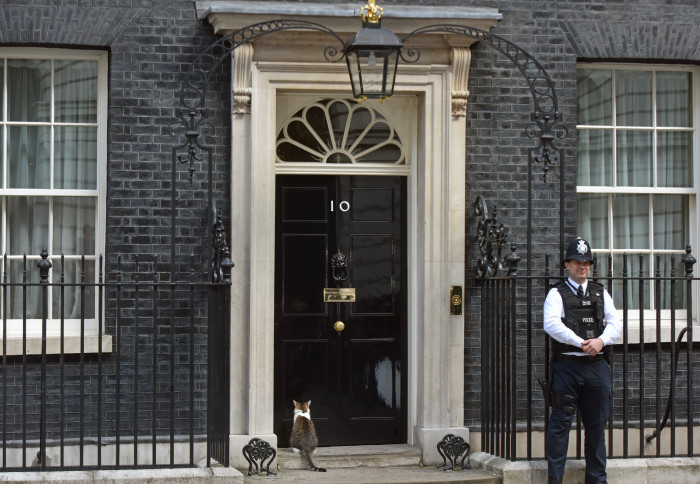Scientists – what next PM must do to tackle UK’s multiple environmental crises

Imperial climate and environment experts react to the resignation of Liz Truss and recommend priority actions for Westminster's next Prime Minister.
The new PM will inherit a host of interrelated emergencies requiring urgent action – energy insecurity, fuel poverty, and the climate and nature crises.
In addition, they will need to rebuild the United Kingdom’s international standing as a leader in tackling climate change, if the country is to play a decisive role in the upcoming United Nations Climate Change Conference (COP27) in Cairo, Egypt, during November.
What can the next PM do about all of this? We asked experts from Imperial College London what they thought.
Cost of living crisis:
 Dr Kate Simpson, research associate in the Dyson School of Design Engineering, Imperial College London, says:
Dr Kate Simpson, research associate in the Dyson School of Design Engineering, Imperial College London, says:
"The government now has a huge opportunity to win back public support by dealing with the matter most urgent to many households – rapidly escalating fuel bills. In the short-term the next PM should look to subsidise energy bills for the most vulnerable, beyond what is already offered, for those most in need and after the next six months.
"At the same time, we need to start rolling out emergency insulation measures – we need crisis teams in every area designated to help people keep warm this winter, with a supply of blankets, and easy-to-install insulation and draught-proofing measures.
"This interaction with households can initiate whole-house plans for longer-term upgrades to move away from gas and improve future fuel security. Going forward, we need a funded national retrofit strategy to enable the upskilling of the supply chain, and information hubs in every area, to deliver these whole-house plans. This cannot wait any longer."
Energy crisis:
 Dr Paul Balcombe, honorary lecturer, Sustainable Gas Institute at Imperial College London, says:
Dr Paul Balcombe, honorary lecturer, Sustainable Gas Institute at Imperial College London, says:
"The next PM must help get the UK on the pathway to fast-paced emissions targets. Liz Truss’s government tried to roll back on green investment, but we need to forget about spending money on developing more gas infrastructure in the UK (fracking and North Sea gas), and instead invest in climate-compatible infrastructure.
"This would mean more home energy efficiency, more renewables, and more low-carbon hydrogen. Ultimately, if the UK can be more 'climate-compatible', it can also be more secure, and it will drive green growth.
"The next PM also needs to improve regulation and transparency of emissions across existing natural gas supply chains in the UK, to bring about fast reductions in methane emissions, particularly around distribution and end-use."
Climate crisis:
 Dr Ajay Gambhir, Senior Research Fellow in the Grantham Institute - Climate Change and the Environment, at Imperial College London, says:
Dr Ajay Gambhir, Senior Research Fellow in the Grantham Institute - Climate Change and the Environment, at Imperial College London, says:
"Liz Truss’s vision fell short because it didn’t demonstrate a credible long-term plan for sustainable development, including tackling the climate crisis.
"'Growth, growth, growth' means nothing if it fails to deal with inequality through progressive taxation and energy market policies, if it fails to protect and restore the environment, and if it fails to project a clear vision for the UK as a leader in a zero-carbon, environmentally sustainable future.
"These are precisely the steps a new PM must take. Without them, that PM’s tenure may well be short-lived too, and all the while the climate crisis is deepening."
Nature crisis:
 Galina M. Jönsson, Research Postgraduate in the Department of Life Sciences, Imperial College London, says:
Galina M. Jönsson, Research Postgraduate in the Department of Life Sciences, Imperial College London, says:
"We need the new PM to put nature at the heart of economic decisions to ensure robust and sustained recovery by restoring and supporting the ecosystems that underpin our lives and livelihoods - and those of future generations.
"Liz Truss's government was on the brink of revoking hundreds of environmental laws, which were rolled over from the EU after Brexit. The new government must instead strengthen and better enforce national environmental legislation, as well as show stewardship in securing an ambitious new global biodiversity deal at the United Nations Convention on Biological Diversity (CDB) COP15 in December."
Global leadership crisis:
 Dr Onesmus Mwabonje, research fellow in the Centre for Environmental Policy, Imperial College London, says:
Dr Onesmus Mwabonje, research fellow in the Centre for Environmental Policy, Imperial College London, says:
"The political crisis engulfing Westminster has significant implications for the UK’s ability to help lead the fight against climate change internationally. We need clear, decisive, and collaborative leadership from all governments, if we are to decarbonise the world and bring greenhouse gas emissions down. With the UN Climate Change Conference, COP27, just a few weeks away, the world needs leaders who can unite others under this common goal.
"Ultimately, countries need to decarbonise deeply – the world is warming and if we don’t take drastic steps to decarbonise we are heading towards more climate change disasters such as floods and fires.
"There are a lot of 'low hanging fruits' to decarbonise, that don’t require much from individuals or governments, such as encouraging people to cycle to work, or take public transport. But they do require leadership, good governance, and a clear sense of direction – none of which is emanating from Westminster right now."
Article supporters
Article text (excluding photos or graphics) © Imperial College London.
Photos and graphics subject to third party copyright used with permission or © Imperial College London.
Reporter
Jez Fredenburgh
The Grantham Institute for Climate Change
Simon Levey
Communications Division